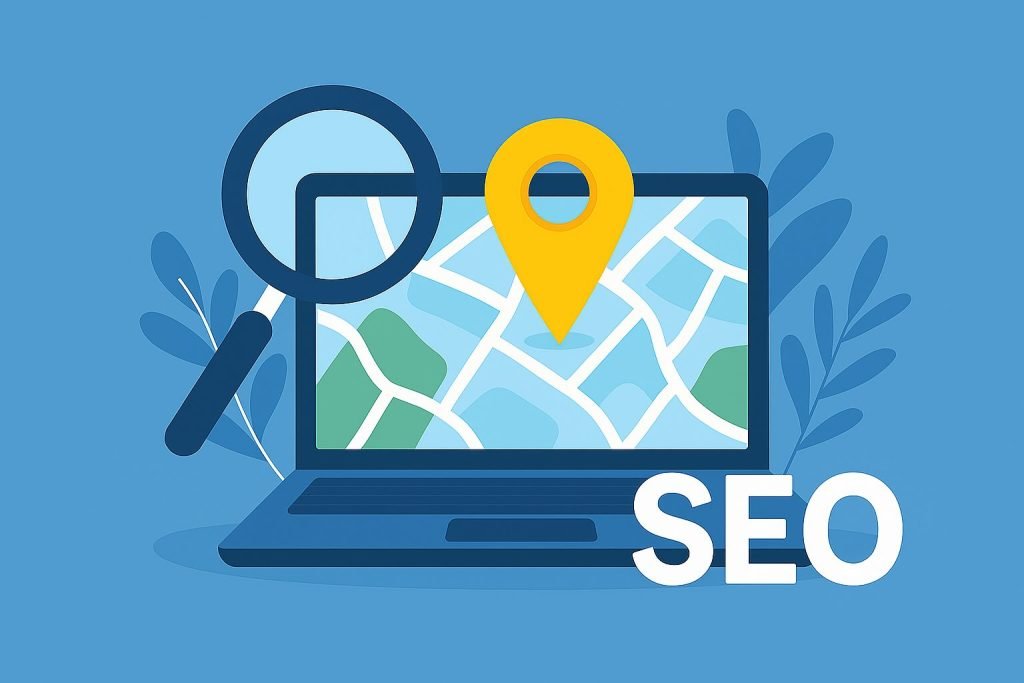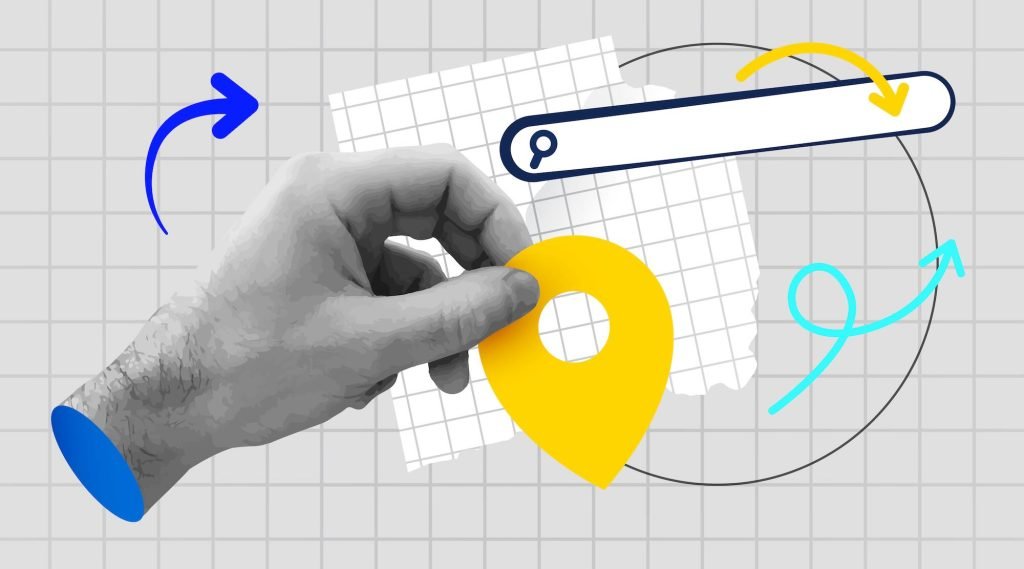Today, having a digital presence goes far beyond just owning a website—especially for local businesses. Local SEO (Search Engine Optimization) is all about making sure your business shows up when people nearby are searching for the products or services you offer. Think about when someone Googles “dentist near me” or “best pizza in Dallas”—Google prioritizes businesses that are not only nearby but also properly optimized for local search.
And this isn’t just for big brands. In fact, local SEO is one of the most powerful tools small businesses can use to attract real traffic—both online and to their brick-and-mortar location.
Whether you run a coffee shop, a hair salon, a CPA firm, or an auto repair shop—if you rely on local customers, then local SEO isn’t optional. It’s essential.
The best part? You don’t need to be a tech expert to benefit from it. In this guide, we’ll break down the most practical steps to help your business show up on Google Maps, local search results, and across the platforms your customers use every day.
Optimize your Google Business Profile (GBP)
If you do only one thing for local SEO, let it be this. Your Google Business Profile is what powers your visibility on Google Maps and “near me” searches.
For many customers, this is their first impression of your business—even before visiting your website. That’s why your profile should be up-to-date, informative, and appealing.
Here’s what to focus on:
✅ Use your exact business name
Avoid stuffing keywords into the name (e.g., “Super Cuts – Men’s & Women’s Haircuts in Brooklyn”)—this violates Google’s guidelines and can harm your rankings.
✅ Pick the right primary category
Your main category determines when you’ll show up in searches (e.g., “dentist,” “bakery,” “veterinarian”). Choose carefully.
✅ Keep hours, address, and contact info accurate
Nothing frustrates customers more than arriving at a closed location. Inaccurate info hurts both traffic and trust—and your search visibility.
✅ Add high-quality, relevant photos
Photos of your storefront, interior, staff, or services in action build trust and make your listing more engaging.
✅ Ask for reviews—and reply to them
Positive reviews boost credibility and ranking. Always respond to reviews, including negative ones—respectful replies can actually improve your brand image.
💡 Pro Tip: Use location-specific keywords in your business description (e.g., “Family-owned accounting firm in downtown Austin” or “Dog grooming studio in the heart of West LA”).
Use local keywords on your website
Local SEO starts with clearly signaling to search engines where you operate. This means using keywords that include both what you do and where you do it.
What’s a local keyword?
A combination of your service + a city or neighborhood. Examples:
- “auto repair shop in Tampa”
- “bicycle repair downtown Portland”
- “CPA firm in Des Moines”
- “pizza delivery Upper East Side NYC”
Where to include them:
- Homepage: “Full-service digital marketing in Sacramento”
- Service pages: “Custom web design in Chicago”
- Meta titles & descriptions: Combine keywords with location
- Headings (H1, H2): These boost local relevance in Google’s eyes
💡 Pro Tip: Use keyword variations too (e.g., “Tampa dentist,” “dental clinic in Tampa,” “Tampa dental services”).
Build local backlinks – better connections, better rankings
Backlinks from other websites are one of Google’s strongest ranking signals. For local SEO, local backlinks are gold—links from reputable sources in your area.
These not only help search rankings but can drive actual traffic from people nearby looking for your service.
Where to get local links:
✅ Local news sites or blogs
Get featured in community news, interviews, or sponsored content (e.g., local chamber newsletter, city blogs).
✅ Business directories and associations
List your business in local or niche directories and industry groups with high domain authority.
✅ Local event sites or influencers
Partner with local events, bloggers, or creators who focus on community content. Even sponsoring a charity run can get you a link!
Why it matters:
- Improves your site’s authority
- Helps Google connect your business to a location
- Brings in traffic from nearby potential customers
- Sets you apart from less-optimized competitors
💡 Bonus Tip: Attend local networking events and request to be listed on their websites afterward.
Create location-based landing pages – Be found in every city you serve
If you operate in more than one city or service area, you need dedicated landing pages for each location. Why? Google needs clear signals about where your business is relevant.
What are location pages?
SEO-optimized pages for each city you serve.
Examples:
- somosmedia.com/seo-austin
- somosmedia.com/seo-denver
- somosmedia.com/seo-miami
What to include:
- Services you offer in that specific city
- Local keywords (e.g., “SEO consulting in San Diego”)
- Address, phone number, and embedded map
- Local client testimonials or case studies
Why this works:
- Boosts your visibility in local searches
- Builds trust with local customers
- Helps outrank competitors who don’t use location pages
💡 Tip: Don’t copy-paste the same content across all pages. Write unique copy for each city, using localized keywords and real examples.
Be listed in local directories – with consistent NAP data
Your website isn’t the only place where you should be visible. Make sure you’re listed in trusted online directories that Google uses to validate your business.
📌 Where to get listed:
- Yelp
- BBB.org (Better Business Bureau)
- YellowPages
- Manta
- Local Chamber of Commerce directories
- Industry-specific platforms (e.g., Avvo for attorneys, Houzz for contractors)
✅ Always use consistent NAP (Name, Address, Phone) information across all listings.
Why NAP consistency matters:
- Boosts Google’s confidence in your business info
- Increases trust from users
- Improves your local search visibility
💡 Tip: Create a master NAP sheet internally and use it for all directory submissions.
Make your website mobile-friendly and fast
Over 60% of local searches happen on mobile devices. If your site loads slowly or is hard to navigate on a phone, users will leave—and Google will notice.
📱 A mobile-friendly website should be:
- Responsive (adapts to screen size)
- Easy to navigate by touch
- Fast loading even on cellular networks
- Readable without zooming
⚙️ Technical tips:
✅ Use responsive themes (e.g., Astra or Hello Elementor)
✅ Choose fast hosting (e.g., LiteSpeed or Cloudflare-enabled providers)
✅ Use caching and image optimization tools:
- WP Rocket (simple and effective)
- NitroPack (CDN, image optimization, and caching in one)
💡 Extra tips:
- Compress images (use WebP, keep size under 200kB)
- Minify JavaScript and CSS files
Test your speed using Google PageSpeed Insights or GTmetrix
Collect and manage reviews strategically – build trust and rankings
Reviews are today’s word of mouth. They not only influence customer trust but also impact local search rankings directly.
⭐ Why reviews matter:
- Google values review count, recency, and star rating
- Over 90% of people read reviews before making a local purchase
- Responses to reviews humanize your brand and boost credibility
📣 How to get more reviews:
✅ Ask directly via email, text, or in person
✅ Use automated follow-ups after purchases or appointments
✅ Share a direct Google review link in follow-up messages
💬 Always respond:
- Thank positive reviewers and make it personal
- Address negative reviews with empathy and solutions—it often earns more trust than perfect ratings
💡 Tip: Make review monitoring a habit. Set aside time weekly to reply and engage.
Local visibility starts with smart strategy
Local SEO isn’t just a set of technical tweaks. It’s a strategy that combines visibility, trust, and user experience.
When you optimize your Google Business Profile, target local keywords, build local backlinks, and deliver a fast, mobile-friendly site with solid reviews—you send a clear signal to Google and your community: you’re the best local choice.
And beyond rankings, you’re building real loyalty and lasting customer relationships.
🎯 Want to grow your local presence? We can help!
At Somos Media, we specialize in local SEO for small businesses, multi-location brands, and service providers across the U.S. and worldwide.
✅ Local keyword strategy & site structure
✅ Google Business Profile setup & audit
✅ Location landing pages & localized content
✅ Review management & backlink outreach
✅ Technical SEO & mobile performance consulting






